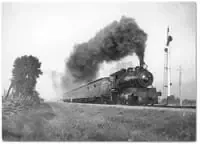
All day – every day – folks email me, text me, twitter me, visit me, call me and instant message me with questions regarding domains, capabilities, CSS, competition, keyword strategies, client issues, sales positioning, marketing strategies, blogging, social media, etc. I get invitations to speak, to write, to help, to meet… you name it. My days are busy and incredibly fulfilling. I’m no genius but I have a lot of experience and people recognize it. I also love helping out.
The challenge is how to apply value to every one of those small issues and opportunities. My view is that it’s sort of like the days of old where the oiler would keep the train wheels oiled so it could move faster and easier down the track. Take away the oiler and the train stops. The oiler knows where, when, why and how much. I feel like the oiler – but on a much broader scale. The questions posed to me require the expertise and experience I’ve built over the last 2 decades.
It’s difficult to value or remember the oiler when you have a train rolling down the tracks, though. The train, the coal, the conductor, the tracks… they’re all ‘big’ expenses and ‘big’ solutions that can be accurately measured. Being an oiler isn’t as simple. I know the train is moving much faster than it would have been had I not been oiling the tracks – but there’s really no sure way of measuring the impact on such a granular scale.
Don’t have an oiler? You can buy those resources elsewhere or do the investigation yourself. It just adds time, expense, risk and may reduce the quality of service you’re providing your customers. You should have an oiler – every organization should.
This doesn’t sound humble, but in my humble opinion, I believe great leaders are often oilers. They work hard every day to remove obstacles so that those around them can push harder, run faster, and be more successful. Teams love the oiler because they can utilize them to be more successful. The question is whether or not the oiler gets the recognition deserved or is understood for the value provided.
What happens when your value is questioned?
Do you stop oiling and put the train at risk as well as build resentment with the other employees that rely on you? Do you, instead, pursue grander projects and opportunities where your value is absolutely measured and understood?
Or… do you stick at what you’re great at? You may be driving your company’s success – but the risk is that some won’t recognize it, know how to measure it, appreciate it… and will often question it. In this world of data and analysis, if you can’t answer what your value is to an organization you might be in trouble.
Are you an oiler? Do you have an oiler at work? Who’s holding your oil can?